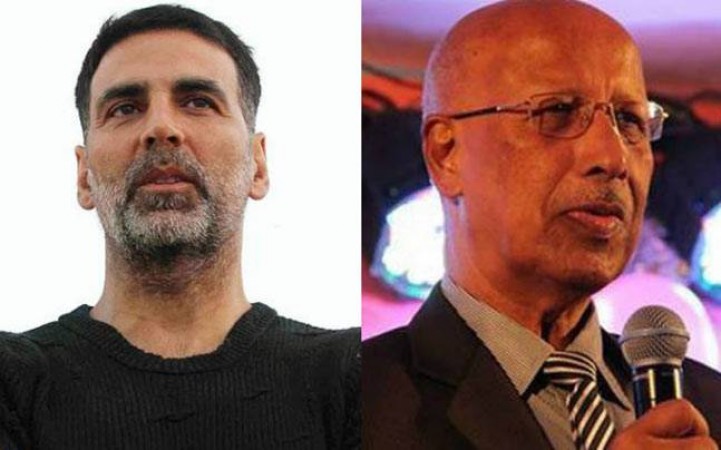
The power of film lies not just in its capacity to amuse, but also in its ability to illuminate real-life tales that have the potential to move, inspire, and educate audiences. Such a cinematic masterpiece is best exemplified by the 2016 release of the Bollywood film "Airlift," which was directed by Raja Krishna Menon. The main character of the movie, Ranjit Katyal, is a fictional creation, but he was inspired by a real-life hero, Kuwaiti businessman Toyota Sunny, also known as Mr. Mathunny Mathews. During the Gulf War in 1990–1991 Mathews was instrumental in helping thousands of Indians who were stranded get evacuated. This article examines Mathunny Mathews' remarkable life story as well as the way his character was portrayed on screen in the movie "Airlift."
We must first examine the Gulf War in order to fully grasp the setting in which Mathunny Mathews rose to fame. The brutal occupation of Kuwait began when Iraq, under the command of Saddam Hussein, invaded the country in August 1990. Indian expatriates in Kuwait, who at the time numbered over 170,000, suffered greatly as a result of the invasion. These people from India, along with people from other nations, were stranded in a chaotic and war-torn area.
Due to his connections to the auto industry, Mathunny Mathews, also known as Toyota Sunny, was a well-known and respected business figure in Kuwait. He had established himself as a prosperous businessman during his several years of residence in the countryside. When the Gulf War started, Mathews was presented with a choice that would ultimately determine his future. He had the chance to leave Kuwait and make sure his family was safe, but he took a different course.
Mathews made the decision to remain in Kuwait rather than leave for safety in order to aid his fellow countrymen who were stranded and in desperate need of help. There were dangers in his brave choice. Even though Mathews was well aware of the risks involved in remaining in a conflict area, his sense of responsibility and concern for his fellow Indians drove him to take action.
The Herculean task of planning an evacuation operation to save thousands of Indians who were stranded was taken on by Mathunny Mathews and other Indian expatriates. This operation required coordinating with Indian and international authorities, aiding those in need with shelter, food, and medical care, and navigating Kuwait's chaos due to the ongoing war.
To ensure the safe passage of Indian nationals, Mathews played a crucial role in negotiations with a number of parties, including the Iraqi government. His unceasing efforts and diplomatic abilities were crucial in facilitating the evacuation. Mathews remained unwavering in his resolve to rescue his countrymen despite numerous challenges and unknowns.
Mathunny Mathews is a fictional character in the film "Airlift," played by Akshay Kumar as Ranjit Katyal. Although the character is not an exact replica of Mathews, the movie heavily references Mathews' heroic actions and real-life experiences. Like Mathews, Ranjit Katyal is a successful businessman who gets caught up in a crisis when the Gulf War breaks out. He went from being a self-centered person to becoming a compassionate leader, mirroring Mathews' own development throughout the evacuation.
Ranjit Katyal struggles with the duty of saving thousands of lives, and the movie deftly captures his emotional turmoil and moral dilemmas. The character of Katyal is portrayed with depth and authenticity by Akshay Kumar, elevating Mathews' brave deeds to the fore of the cinematic experience.
The audience's ability to feel strongly after watching "Airlift" is one of its most alluring qualities. Viewers can relate to the stranded Indians' plight because the movie depicts their hope, fear, and desperation. The audience is moved by Ranjit Katyal's unflinching commitment to supporting his fellow countrymen in the face of overwhelming obstacles.
A testament to Mathunny Mathews' true-life bravery is the film's emotional impact. His dedication to the welfare of his fellow Native Americans and willingness to make the ultimate sacrifice for them serve as a stirring example of the human spirit's resilience in the face of hardship.
During the Gulf War, Mathunny Mathews performed many brave acts that were well-received. Numerous Indians who were saved as a result of his unwavering dedication to the evacuation effort respected and thanked him. For his contribution to the rescue effort, he was recognised with a number of awards and accolades, including the Pravasi Bharatiya Samman, the country's highest civilian honour for non-resident Indians.
As a representation of bravery, compassion, and selflessness, Mathews' legacy endures. His story serves as motivation for both individuals and nations, reminding us of the value of speaking out for the welfare of our fellow humans during difficult circumstances.
While "Airlift" is a work of fiction, Mathunny Mathews, a remarkable person who stayed behind in Kuwait during the Gulf War to lead the evacuation of stranded Indians, is deeply rooted in real-life heroism, which served as the inspiration for the film's portrayal of Ranjit Katyal. Mathews' bravery, tenacity, and selflessness have inspired and continue to inspire generations in India and around the world.
The movie "Airlift" honours Mathews' heroic deeds while also serving as a moving reminder of the strength of kindness and compassion in the face of hardship. The person who created the character, Mathunny Mathews, will always be regarded as a real hero who stood unwaveringly in the defence of his fellow citizens during their time of need.
Raghav Chadha's Rajasthan Wedding Draws Punjab Police, Sparks Controversy